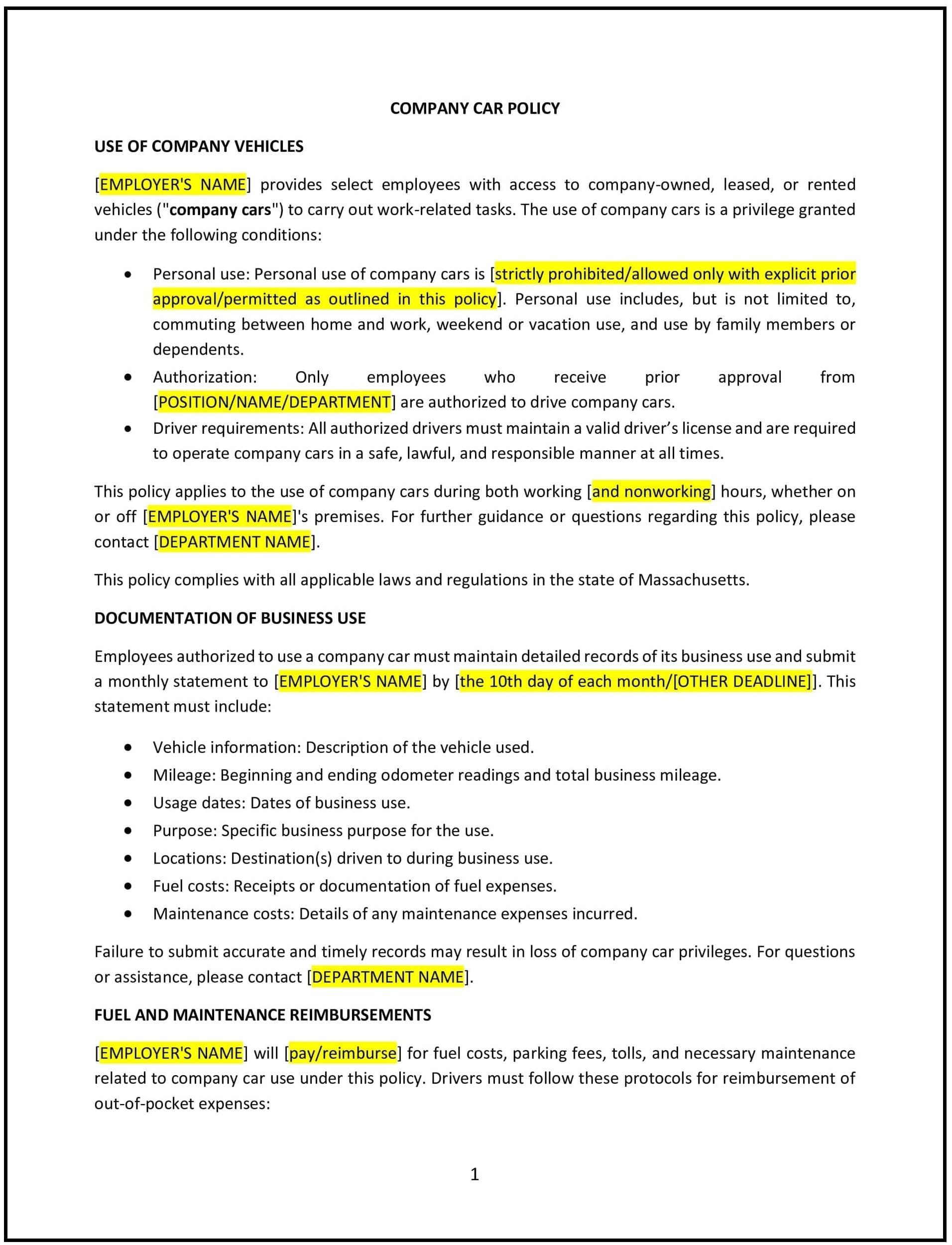Got contracts to review? While you're here for policies, let Cobrief make contract review effortless—start your free review now.

Customize this template for free
This company car policy is designed to help Massachusetts businesses establish clear guidelines for the use of company-owned vehicles. The policy outlines the rules for employees who are provided with a company car, including eligibility, acceptable use, maintenance requirements, and responsibilities. The policy aims to ensure that company cars are used efficiently, safely, and in compliance with state and federal regulations.
By adopting this policy, businesses can mitigate the risks associated with vehicle use, protect company assets, and promote responsible behavior among employees using company cars.
How to use this company car policy (Massachusetts)
- Define eligibility for company cars: Specify which employees are eligible to receive a company car. Eligibility criteria may include job roles (e.g., sales representatives, executives), mileage requirements, or specific needs for business travel.
- Outline acceptable use of company cars: Define the acceptable use of company cars, including whether they are for business use only or if employees are permitted to use them for personal purposes. If personal use is allowed, specify any restrictions (e.g., limited use for personal errands or commuting).
- Set rules for maintenance and care: Specify the employee’s responsibility for the maintenance and care of the company car, including regular cleaning, fueling, and reporting any mechanical issues. The policy should also clarify who is responsible for the cost of maintenance, insurance, and fuel.
- Provide guidelines for insurance and liability: Outline the insurance coverage provided for company cars, including liability, collision, and comprehensive insurance. Specify the employee’s responsibility for reporting accidents or damages, and the procedure for filing claims.
- Address driving safety: Establish rules for safe driving practices, such as adherence to traffic laws, wearing seat belts, avoiding the use of mobile phones while driving, and following company policies regarding driving under the influence of alcohol or drugs.
- Outline the process for reporting accidents: Specify the steps employees must take in the event of an accident, including contacting the police, reporting the accident to HR or management, and providing necessary documentation (e.g., police report, insurance claim).
- Define personal use restrictions: If personal use is allowed, specify any restrictions on mileage, geographic limits (e.g., within state boundaries), or the frequency of personal use. Clarify whether employees are expected to reimburse the company for personal use or fuel costs.
- Set expectations for returning the car: Specify the procedure for returning the company car when it is no longer needed, when the employee leaves the company, or when the car is being replaced. The policy should include expectations regarding the return of keys, fuel levels, and condition of the vehicle.
- Ensure compliance with Massachusetts and federal laws: Ensure the policy complies with Massachusetts state laws regarding the use of company vehicles, traffic violations, and insurance requirements, as well as relevant federal regulations. The policy should address vehicle registration and inspection requirements.
Benefits of using this company car policy (Massachusetts)
This policy offers several benefits for Massachusetts businesses:
- Protects company assets: By setting clear rules for the use, maintenance, and insurance of company cars, businesses can protect their assets and reduce the risk of financial loss due to accidents, damages, or misuse.
- Reduces liability risks: Clear guidelines for insurance, reporting accidents, and safe driving practices help businesses reduce liability risks associated with employee use of company vehicles.
- Improves employee accountability: A well-defined policy promotes accountability among employees by ensuring they understand their responsibilities when using company cars.
- Enhances safety: By promoting safe driving practices and adherence to traffic laws, the policy can help reduce the likelihood of accidents and injuries while employees are driving company cars.
- Strengthens legal compliance: The policy helps the business comply with Massachusetts state laws and federal regulations regarding the use of company vehicles, including insurance, vehicle registration, and employee safety regulations.
- Increases operational efficiency: Providing clear guidelines for vehicle use, maintenance, and fuel management ensures that company cars are used efficiently, contributing to the smooth operation of the business.
Tips for using this company car policy (Massachusetts)
- Communicate the policy clearly: Ensure that all employees who are eligible for a company car are aware of the policy, including expectations for use, maintenance, and safety. This can be communicated during onboarding, through employee handbooks, and in one-on-one discussions.
- Regularly inspect vehicles: Implement regular vehicle inspections to ensure that company cars are in good working condition, safe to drive, and compliant with Massachusetts state regulations.
- Monitor fuel usage and expenses: Set guidelines for monitoring fuel usage and tracking expenses related to company car use. Consider using fleet management software or a fuel card system to manage these expenses effectively.
- Enforce safe driving practices: Reinforce the importance of safe driving habits, such as obeying traffic laws and avoiding distracted driving. Consider offering defensive driving courses to employees who frequently use company vehicles.
- Ensure that employees are aware of insurance coverage: Make sure that employees understand the insurance coverage provided by the company and their responsibilities in case of an accident. This includes reporting accidents promptly and following company procedures for filing claims.
- Review and update regularly: Periodically review and update the policy to ensure it is compliant with Massachusetts state laws, federal regulations, and any changes in company practices or vehicle fleet management needs.